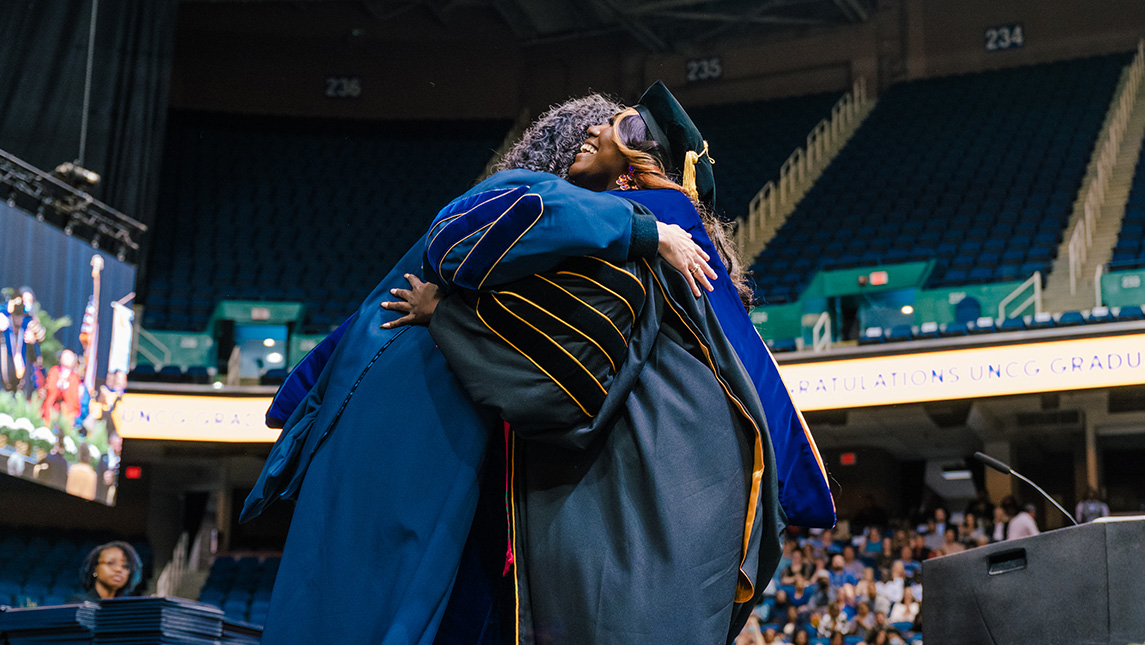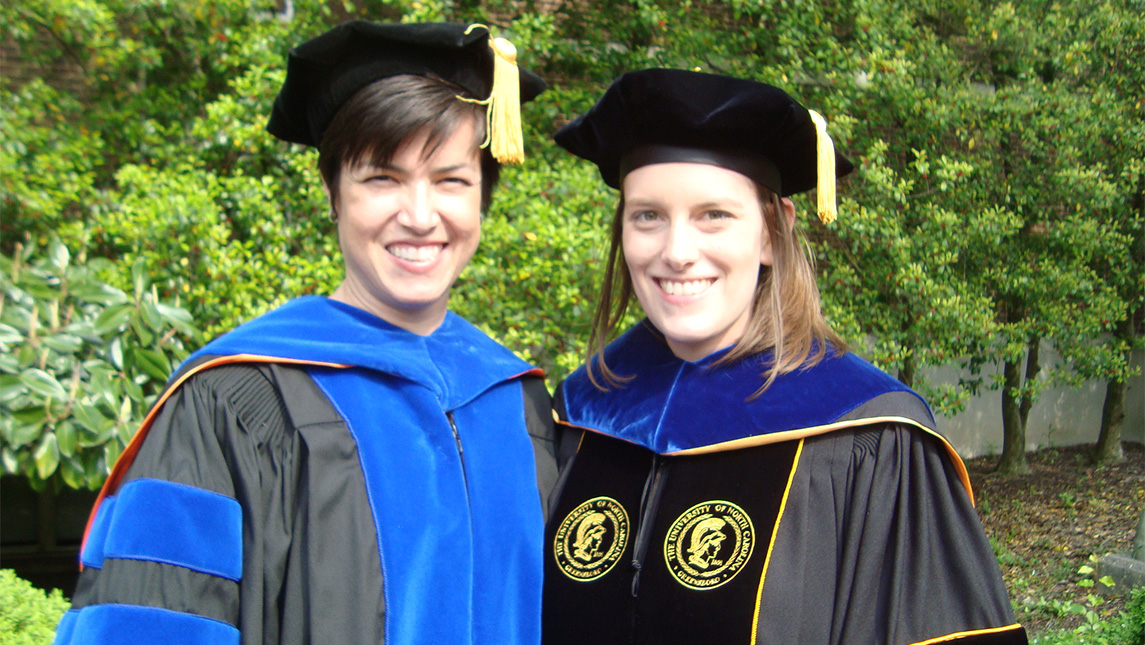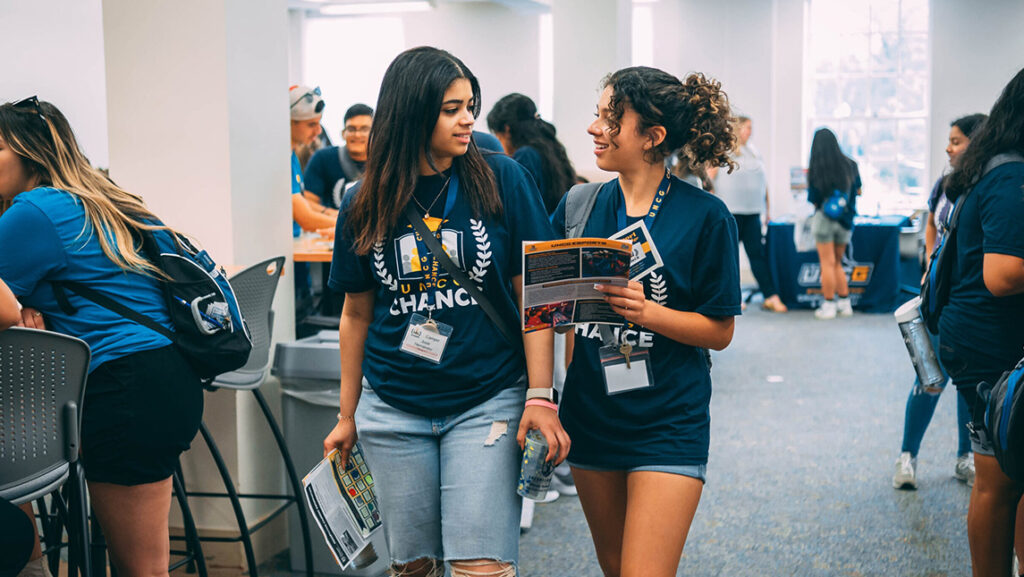Like many people around the world, Professor Dr. Beatrice Kuhlmann ’13 had plans that were disrupted by the global spread of the COVID-19 virus in 2020. A psychology conference would have brought the UNC Greensboro alumna back from Germany to the United States.
“I was happy that the conference fell during my Easter break,” says the chair of cognitive psychology and cognitive aging at the University of Mannheim, Germany. “And I could go to Asheville for a mountain vacation with my boyfriend – now husband. That was all cancelled.”
Kuhlmann is eager to give back to her field of research since earning her doctoral degree in psychology at UNCG. She talked with her colleagues about what they could do in its place. They decided to host their own online conference. In April and May 2020, they held the inaugural One World Cognitive Psychology Seminar. Presenters joined in from all over the world, including her mentor, former UNCG Psychology Professor Dayna Touron.
“It served a special purpose in the pandemic,” says Kuhlmann. “I think it still does in some ways, because we’re such an international community.”
Now, the conference has grown beyond just a small pandemic fix – all thanks to Kuhlmann.
From Germany to Greensboro
Kuhlmann seized many opportunities worldwide to get to where she is now. She crossed six time zones and more than four thousand miles to study at UNCG.
She’s always been interested in cognitive psychology – the study of people’s mental processes. She feels the need to build our understanding of how the mind works as we age is crucial to families and communities. “I saw the impacts of aging with my grandma,” she says. “In our family, we just accepted memory loss and cognitive deficits. But is that really it? Are we accepting it too soon?”
Kuhlmann got her bachelor and master of science degrees at the University of Mannheim, but she wanted to go to the U.S. for her doctorate after listening to a visiting professor from North Carolina. “I found some labs in Greensboro that I was interested in. It was a good fit. And I’d already spent some time abroad in the U.S. as an undergraduate and during high school.”
Kuhlmann adapted to living in another country while she also rose to the demands of her dissertation. Fortunately for her, Touron was an accommodating mentor.
“She was always available and enthusiastic,” says Kuhlmann. “She gave birth to her second child during that time. I’m pregnant now and trying to figure out how to do that with my own Ph.D. students, so in hindsight, I’m even more impressed.”
After earning her doctorate in 2013, Kuhlmann returned to Germany and to the University of Mannheim, this time as a professor. “I always wanted to stay at the university,” she says. “What drove me most was doing research, and teaching comes with that.”
Finding her niche
Kuhlmann attended her first Psychonomic Society conference while she was still a student. She says it felt like home. “It’s basically the most important society in my field. They host a yearly meeting, and you feel you’re missing out if you don’t go.”
She continued the One World Seminar after the success of the one in the spring of 2020. Eventually, it grew so big that she knew she could not continue managing it, especially as she resumed the pre-COVID-19 obligations of teaching in Mannheim. She asked the Psychonomic Society to take it over. They’ve since made it a permanent conference.
She contributes to the Society, supporting psychology students and faculty as an editor and writer for their journal Cognitive Research: Principles & Implications. She says, “If they ask me to do something, I feel that, yes, I want do something because I want to give a lot back.”
In 2022, the Society gave Kuhlmann its Early Career Award. It was an honor to receive that recognition, she says. “Though I can still talk to Dayna, after getting your Ph.D., you’re doing what you learned and trying to find your niche. You get less feedback. Getting an award from the society that stands for your research field is validation that my research is taking a meaningful path.”
Story by Janet Imrick, University Communications
Photography courtesy of Beatrice Kuhlmann

Join a global community of experts.



